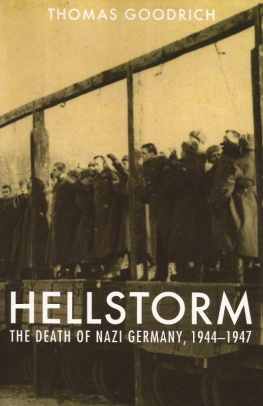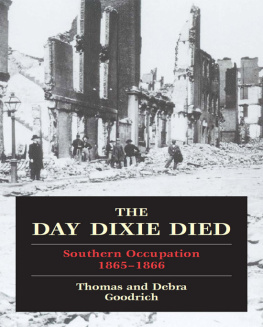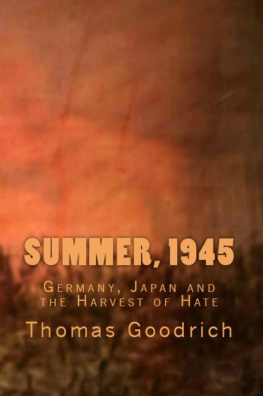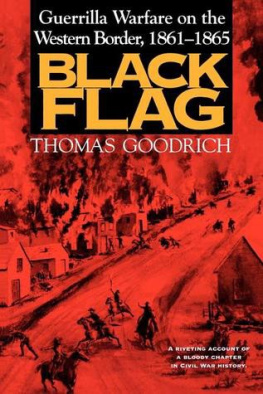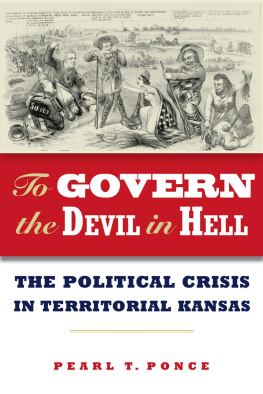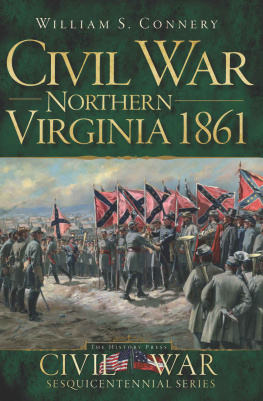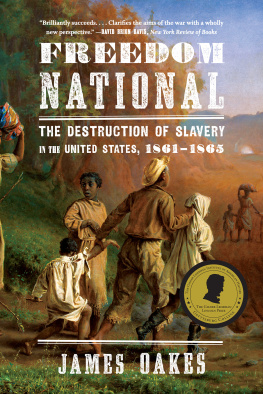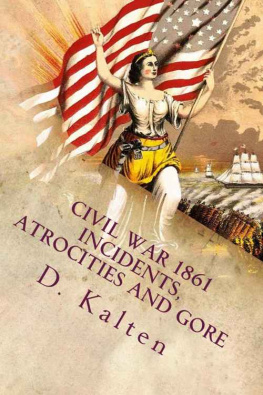
To Maurine
EPILOGUETHE STRANGER
TO THE SURPRISE OF NO ONE, WHEN THE PROSLAVERY CONSTITUTION WAS FINALLY placed on the block in 1858, it was soundly rejected by the voters of Kansas. And thus, as the people of the territory registered their determination to waitforever, if necessaryuntil a friendly federal government admitted them into the Union as a free and equal member with no strings attached, the last hope of the South in Kansas was dashed forever. And with that grim understanding, secession voices, crying so long in the wilderness, now began to be heeded in deadly earnest.
Although the last proslavery threat to Kansas had been finally erased, James Montgomery and Charles Jennison acted as if the territory was still at war. Continuing the rampage begun in 1857, these men and their Jayhawkers scoured southern Kansas, looting homes, stealing livestock, aiding fugitive slaves, and killing any who got in their way. During one week in December 1860, three men were murdered in succession, ostensibly because they were proslavery or had helped return runaways to Missouri. When the supply of southern victims ran low, the Jayhawkers turned their sights on free-state Democrats, and when this quarry, too, became scarce, moderate Republicans were next in line.
We are neither Democrats nor Republicans, announced Montgomery, but abolitionists. We are determined that slaves shall never be retaken in Kansas. We intend to operate against South-west Missouri as soon as we clear out all opposition in the Territory.
As prophets North and South had warned, and as the words and deeds of Montgomery, and John Brown before him, revealed, radical abolitionists cared for Kansas only insofar as it provided a fortress for attacks against slavery in Missouri and Arkansas. With the black clouds of war lowering over the nation following the election of Abraham Lincoln and the consequent secession of southern states, and with the ravenous Kansas Jayhawkers poised for a swoop into the state at the first opportunity, many Missouri slaveholders now began to voluntarily dismantle the system. While some masters allowed their runaways to simply walk away to Kansas and freedom, others shipped their bondsmen to southern markets by the thousands.
[A]t the rate slaves have been sold South for the past six months, a happy Kansas editor reported, slavery in western Missouri will cease before the end of three years.
For some Kansans, three years was too long to wait. Although slave raids into Missouri were still relatively rare, several had occurred. One foray stood out from the rest. On a sunny afternoon in mid-December 1860, a tall, handsome stranger approached the Blue Springs plantation of wealthy slave owner Morgan Walker. The stranger was dirty and unshaven for he had been hiding in a heavy thicket only a mile from the home. The stranger was also troubled. A former free-soiler from Kansas, he had of late undergone a powerful, wrenching change. As a letter to his Ohio mother makes clear, the transformation had been well on its way to completion one year before.
You have undoubtedly heard of the wrongs committed in this territory by the southern people, or proslavery party, but when one once knows the facts they can easily see that it has been the opposite party that have been the main movers in the troubles & by far the most lawless set of people in the country. They all sympathize for old J. Brown, who should have been hung years ago, indeed hanging was too good for him. May I never see a more contemptible people than those who sympathize for him. A murderer and a robber, made a martyr of; just think of it.
Now, at Walkers, the young stranger was about to turn his back forever on the old life and cross the threshold to a new. According to Walkers grown son, Andrew:
He told my father that he was with a party of three men who had come over from Kansas to rob us of our money, horses and mules and run off our niggers. He said he would aid us in thwarting their designs. We got several men together between that time and dark.... We had it all arranged that when the robbers came to the door a lighted candle was to be placed in one of the windows.
That moonless night, as promised, the Kansan led his three companions to the Walker home. We have come to take your niggers with us to Kansas, the stranger announced as he stepped into the house. We also want your horses and mules and what money you have in the house.
Andrew Walker:
My father replied that if his niggers wanted to go to Kansas they were at liberty to do so, but he did not see any reason why those who did not want to go should be compelled to leave him and he thought he ought to have his stock and money left him. The other three were standing outside the door, which was then shut; a candle was put in the window and the other lights turned out. We then opened fire on the three....
In the blaze of buckshot that swept the yard, one abolitionist dropped dead while another helped his wounded comrade into the night. The respite was brief. A negro servant of my fathers saw them in the brush a few days later, concluded young Walker. My father and I shouldered our guns... and went after them, and they were buried right there.
For his role in the affair at Morgan Walkers, the stranger was awarded a horse, one hundred dollars, and a warm welcome to his new home and new life in Missouri.
One month later, on the evening of January 29, 1861, Benjamin Simpson and other members of the territorial legislature were sitting in session at the Eldridge House in Lawrence. There were from three to four inches of snow on the ground, Simpson noted, signifying an end to a terrible, year-long drought, and the night was windy and cold.
It must have been as late as nine oclock when D[aniel] R. Anthony... came into the hotel with sturdy stride and flashing eyes, and told us that the President of the United States had that day signed and approved the bill admitting Kansas into the Union. He brought with him and scattered around extras issued by a newspaper published at Leavenworth... announcing the joyful tidings in flaring headlines.
With one voice, the assembly exploded in a wild celebration of shouts, cheers, and laughter. Men ran from place to place proclaiming the glad tidings, rang one reveler. Cheering and music and all manner of exultation was heard everywhere through our streets.
[T]he news ran through the town like wildfire, an elatedand now inebriatedBen Simpson added. Houses were lighted, doors were thrown open (and some were broken open), the people gathered in public places... toasts were drunk; songs were sung; speeches were made, and well, the truth is, that my recollection is not good after midnight.
With incredible speed, the glorious word spread until the entire new state had joined the jubilation. While a grateful Charles Robinson quietly prepared to don his well-earned and long-postponed mantle as the first governor of Kansas, and while his archenemy, James Lane, after a miraculous political comeback, schemed his way toward the U.S. Senate, those Kansans of more modest aspirations were merely thankful that the territorial days were mercifully at an end and that their new western home had finally moved to America.
At last, sighed a Manhattan editor, the great victory, for which the people of Kansas have fought so many hard battles against the slave power, suffered so many acts of injustice, at the hands of a corrupt and vindictive Administration, and submitted to so many sacrifices and privations, is won! We are a FREE and Sovereign State!!
The celebration on this snowy winters eve was not dampened in the least by the looming prospect of war nor the growing national crisis that would increasingly focus on a fort in Charleston Harbor. For seven long years the people of Kansas had fought the fight of the North, and the moment to set down a heavy load was at hand. And if the horrors of civil war did indeed engulf the nation, many in Kansas felt it was only fitting that all of America should finally join in. Some, like James Redpath, Julia Lovejoy, and James Montgomery, actually welcomed war. Even had these individuals, and many more just like them, been able to peer into the future and see what lay ahead for America, their attitude would not have changed in the least. Even could they have viewed for themselves the blood-soaked sod at Shiloh and Antietam or the hideous heaps of corpses at Fredericksburg, Franklin, and a score of other slaughter pens, they would have felt the sacrifice a necessary one to atone for the sin of all sins: slavery. However, could these same people, now so lighthearted and gay, have looked ahead into their own future, it might have given them reason to pause. Could they have but gazed at the death and destruction and desolation that was coming to Kansas, at their own towns and villages enveloped in smoke and flame, at the bodies of friends, neighbors, and loved ones strewn about the fields and streets, it is doubtful few, if any, would have been so eager for the terrible storm that was now rushing down on them with the force of a tornado.
Next page

